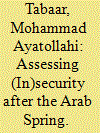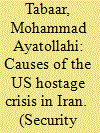|
|
|
Sort Order |
|
|
|
Items / Page
|
|
|
|
|
|
|
| Srl | Item |
| 1 |
ID:
126415


|
|
|
|
|
| Publication |
2013.
|
| Summary/Abstract |
In nearly three years, Egypt has transitioned from a large-scale uprising against one of the region's longest-standing rulers to an even more massive revolt that led to the military ousting the country's first democratically elected president, Mohamed Morsi. Between the two popular uprisings, new pacts and unlikely alliances emerged, deepened, and, in some cases, then disappeared. For its part, the army evolved from being an accomplice of the old regime, to then being an uneasy partner of the ascendant Muslim Brotherhood and, most recently, on to rebranding itself as an ally of non-Islamists and a protector of the popular will. Loosely aligned liberals, leftists, and nationalists, meanwhile, shifted from offering support for democratic elections to backing a "democratic" coup out of fear that the elected Islamists might monopolize and never relinquish power in a conservative new regime. That fear came in response to the Brotherhood's own shifting position, which moved from a commitment to "participation not domination" to a strategy of controlling the legislature and the presidency, although they were ultimately forced back into hiding before they could neutralize the judiciary and the army. And finally, the other Islamist movement, the ultraconservative Salafists, initially displayed no interest in the political process, but then mobilized and ultimately enjoyed striking success in the elections of 2011-12. Surprisingly, however, despite their presumed ideological proximity to the Brotherhood, many Salafists went on to back the military's removal of Morsi in July 2013, but then did not lend support to the interim government that was constructed in wake of Morsi's fall. In this multilayered, fast-paced political environment, mass protests, arrests, and violence have become routine.
|
|
|
|
|
|
|
|
|
|
|
|
|
|
|
|
| 2 |
ID:
155060


|
|
|
|
|
| Summary/Abstract |
This article provides a revisionist account of the occupation of the US embassy in Tehran in November 1979, one of the most conspicuous manifestations of anti-Americanism in recent history. Drawing solely upon primary documents, largely from various Iranian communists and Islamists, it questions the conventional wisdom that the Islamists' takeover of the embassy was a grassroots reaction to American policies, particularly after President Carter admitted the ailing Shah. It also challenges the argument that the radical students stormed the embassy primarily to bring down the nationalist provisional government. Instead, I introduce a critical overlooked factor and argue that the Hostage Crisis can be better explained as a preemptive act by the Islamists to outbid the leftists' anti-American activities. I demonstrate that the United States and the Islamists were seeking to maintain normal relations during and even after the 1979 revolution. However, various communist organizations that surfaced after the revolution posed an existential threat to the new Islamist-nationalist government, quickly dominating universities, labor unions, and intellectual circles throughout the country and accusing the Islamists and their nationalist allies of collaborating with the United States. In this climate, the Islamists strategically adopted the Left's anti-imperialist language and eventually occupied the US embassy to establish their anti-American credibility.
|
|
|
|
|
|
|
|
|
|
|
|
|
|
|
|
| 3 |
ID:
164295


|
|
|
|
|
| Summary/Abstract |
This article examines the domestic causes of the Iran–Iraq War. It delves into secret discussions among Iranian political and military elites during the conflict, their analyses of their own performance on the battlefield, and their revealing public disputes and blame game decades later. It contends that an underexplored and yet critical driving force behind Iran’s prosecution of the war was factional politics. Along with state-level geo-strategic, regime-level security and individual-level ideological concerns, factional factors must also be examined to understand Tehran's war-time decisions. Iran’s factional rivalries began between the Islamists and the nationalists; and between the Islamic Revolutionary Guard Corps (IRGC) and the army at war’s outbreak, and eventually penetrated into the heart of the Islamist camp between the militant clerics and the IRGC.
|
|
|
|
|
|
|
|
|
|
|
|
|
|
|
|
| 4 |
ID:
182250


|
|
|
|
|
| Summary/Abstract |
The Islamic Republic of Iran is a state divided against itself. Since
its inception in 1979, it has been de¼ned by tension between the
president, who heads its elected government, and the supreme
leader, who leads the parallel state institutions that embody modern
Iran’s revolutionary Islamist ideals. The current supreme leader, Ali
Khamenei, served as president from 1981 to 1989. During his tenure as
president, he clashed over matters of policy, personnel, and ideology
with the supreme leader at the time, Ruhollah Khomeini, the charismatic
cleric who had spearheaded the Iranian Revolution. After Khomeini
died, in 1989, Khamenei was appointed supreme leader and went on to
do battle with a long line of presidents more moderate than himself.
|
|
|
|
|
|
|
|
|
|
|
|
|
|
|
|
| 5 |
ID:
176096


|
|
|
|
|
| Summary/Abstract |
RELIGIOUS PARTIES AND THEIR IDEOLOGIES have captured the imagination of academic scholarship and public discussion since the 1980s. Specifically, Islamist parties have become a focal point as they entered the electoral politics of many Middle Eastern countries. Much of this focus is devoted to how such parties engage in ideological moderation—a legitimate academic concern with important practical implications for democratic governance, pluralism, and violence. Observers often treat religious ideology either as a fixed attribute on one extreme, or as an entirely malleable and instrumental feature on the other. For example, the Turkish president and leader of the Justice and Development Party (AKP), Recep Tayyip Erdoğan, has been criticized since his rise to political prominence in the mid‐1990s for being too ideologically rigid and threatening secularism in Turkey, gradually moving the country closer to a theocracy.1 Simultaneously, Erdoğan is characterized as a political opportunist who has no ideological commitments and exploits religion with reckless abandon to serve his own political interests.2 Yet these two seemingly conflicting views are not incompatible.
|
|
|
|
|
|
|
|
|
|
|
|
|
|
|
|
|
|
|
|
|